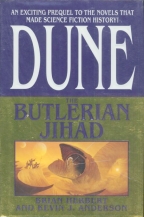Dune: The Butlerian Jihad
Tor / Tom Doherty Associates
US Hardcover First
ISBN 0-765-30157-1
Publication Date: 09-21-2002
621 Pages; $27.95
Date Reviewed: 09-23-02
Reviewed by Rick Kleffel © 2002
|

|
|
REFERENCES
|
COLUMNS
|
|
Science
Fiction
|
10-03-02
|
Some writing opportunities seem simultaneously enviable and
terrifying. Frank Herbert's universe, as created in the classic novel
'Dune' is ripe with opportunity for the writer. Readers might well be
terrified, lest their favorite work be devalued by inept execution.
Brian Herbert and Kevin J. Anderson are clearly up to the challenge.
'Dune: The Butlerian Jihad' offers a curiously pleasing combination
of soap opera in space, retro science fiction and cleverly plotted
revelatory satisfaction. Herbert and Anderson manage to whip up a
very quick, clear and complex universe even for readers who haven't
touched a 'Dune' novel in 20 years. They also discard about that much
of the history of science fiction as well. It's a great choice. 'The
Butlerian Jihad' is a pleasure to read. Guilt feelings are left as an
exercise for the reader.
The novel wastes no time whatsoever setting things up, and does so
in a brusque manner reminiscent of the screen crawl that tends to
open space opera movies. The info-dump itself is pretty basic; having
spread across the stars, humanity became complacent, and then it
became enslaved by the artificial intelligences it had created. Some
humans have escaped and created the pre-Dune version of the
Federation of Planets, which exists in an uneasy Cold War with the
Synchronized Worlds, each ruled by a constantly updated version of
the Omnius AI. The Synchronized Worlds are saved from staleness by
the cymeks, human brains-in-a-bell-jar connected to robotic bodies;
they keep alive the savage hatred required to keep billions of humans
in slavery. As the novel opens, the Cold War ends and open warfare
begins.
'The Butlerian Jihad' is written in the style of a best selling
thriller, with alternate chapters telling the tales of numerous
characters, most of whom come to meet in the narrative of the novel.
Herbert and Anderson pile on the charm best when they create the
legends behind such familiar names as melange, the Bene Gesserit, the
Fremen and the Holtzman shield. Each of the seeds behind these
familiar terms from the original novel is an enjoyable return to a
wonderfully familiar universe. We're not talking about startling
innovations in this novel. But the familiarity register rings
dutifully off the scale. The writers handle their material in a
thoroughly professional, old-style science fiction manner. It's
really satisfying to this long-time 'Dune' fan.
When Anderson and Herbert get to the Harkonnens and the Atreides,
they tread on more sensitive ground. In these characters lie much of
the heart of Herbert's novels. Here they tend to mix things up a
little, and the main characters they create are the better for it.
Xavier Harkonnen is a priggish hero, full of classic bravado and a
bit deliberately stuffy. His counterpart, Vorian Atreides is the smug
son of an infamous cymek, blissfully unaware that he's been working
for the bad guys. The characters both set up some interesting
resonances with the readers' memories of other Harkonnens and
Atreides. They also work well into Herbert and Anderson's fairly
complex mosaic.
The other big piece of the puzzle is Serena Butler, the
charismatic woman who becomes the crux of a love triangle right out
of 'Days of Our Lives'. But these 'Days' are passing in the 'Dune'
universe, giving them a lot more heft and the upshot of the triangle
a lot more punch. Herbert and Anderson architect this whole structure
quite well, setting into motion wheels within wheels that never
actually even get on the ground in this first installment. Though the
pacing is torrid, and at time approaching hurried, not all plot
threads are resolved.
It's surprising then how satisfying the novel is in spite of some
lack of resolution. Herbert and Anderson have an absolutely unified
voice that never wavers. The plot is comfortably satisfying and
exciting in its introduction of several characters who will clearly
prove to be pivotal in 'Dune' future history. It's also an
interesting exercise in deliberately retro science fiction.
Particularly in their concept of AI's, the authors ignore a lot of
the recent and messier thoughts about AI in favor of a very clear-cut
Aggressive Menace axiom. They also have a fascinating throwback to
actual human slavery spread wide across the galaxy. This isn't the
usual science-fictional form of covert (via manipulated
reality/media) or innate (via genetic engineering) slavery. This is
whips and chains of the American South slavery, performed not only by
the cruel AI's and their cymek minions, but by the humans of the
League worlds as well.
The slavery is accepted on the League world due to another major
Dune component that's handled rather well in this novel, and that's
religion. The authors get the religion going on two fronts --it's
enjoyable because the forerunners of the Fremen beliefs are all too
apparent, and because it plays well into the political bickering and
manipulation that is also one of the enjoyable hallmarks of the
'Dune' novels.
To this reader there was a lot to like in 'Dune: The Butlerian
Jihad'. Sure, it's a bit on the old fashioned side, but it's well
executed, filled with lots of events and characters that readers of
the original novels will find endearing and entertaining, and moves
fairly fast for a rather large novel. It's an enjoyable slab of space
opera that keeps the pages turning and the lights burning. It manages
to be readable in and of itself, and leaves the reader wanting the
next installment sooner than it is likely to come out. In all the
important ways, 'The Butlerian Jihad' a smashing success.
